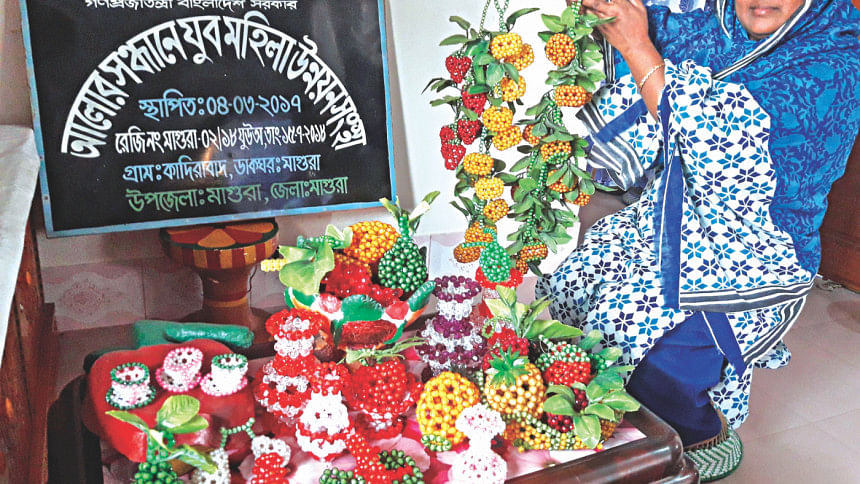From going hungry to offering jobs

It is a perfect example of how perseverance pays off.
Married off in the late 90s while still a schoolgoer, Taslima Khatun and her unemployed husband were barely making ends meet, having no place of their own and often going hungry.
Now not only does she earn around Tk 25,000 a month but also employs around 50 students and homemakers and imparts training on her skills.
This did not come about overnight. Necessity prompted her to get enrolled for whatever free training was available at government institutions in her hometown of Magura sadar upazila since 2004.
It ranged from poultry and cattle rearing to mobile servicing. She stuck to packaging and tailoring while picking up from a neighbour the know-hows of making household items by processing discarded paper.
The most prominent of her products is the Nakshi Kantha, the embroidered quilts traditionally made by layering discarded "dhotis" and saris.
The household and decorative items, such as flower vases, mats, small stools, replicas of fruits, toys, penholders, trays, dishes, baskets and cups, are all made from the processed paper and plastic beads.
She sources discarded paper, books and newspapers from her Kadirabad village. Mixing it with water and arrowroot makes it lumpy, which is then given shape by hand to create the different items.
Once sun-dried, the finishing touches are added, such as polishing using a whetstone and adding colours with a paintbrush. The beads are bought from the market and strung up to form objects.
Talking to The Daily Star recently, she said her stocks go out solely from demand of her neighbours and from local fairs.
Each Nakshi Kantha brings a profit of around Tk 2,000 on selling for around Tk 5,000 while the margin varies for the other products. For instance the prices of the vases range from Tk 300 to Tk 2,000, over two-thirds of which is profits.
Meanwhile, she has been able to get her husband Humayun Kabir a job in Dubai and, coupled with the remittance he sends, has already repaid the Tk 80,000 she borrowed for the migration from her father and a local lender.
One of Taslima's employees, Tanzina Islam, works part time to bear her educational expenses.
Another, Ambia Aktar, terms Taslima a local icon. "We are earning and maintaining our educational expenses by working here. She is contributing a lot for the society," she said.
Authorities at the youth and women affairs training centres too were all praises about Taslima.

 For all latest news, follow The Daily Star's Google News channel.
For all latest news, follow The Daily Star's Google News channel. 




Comments